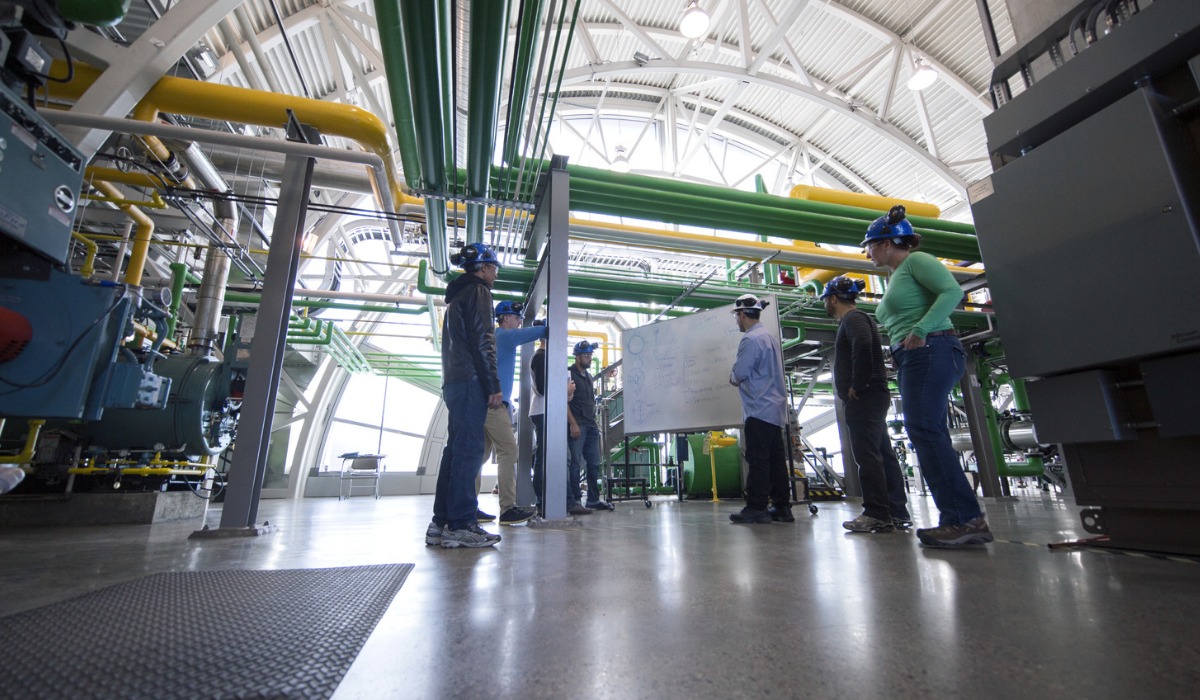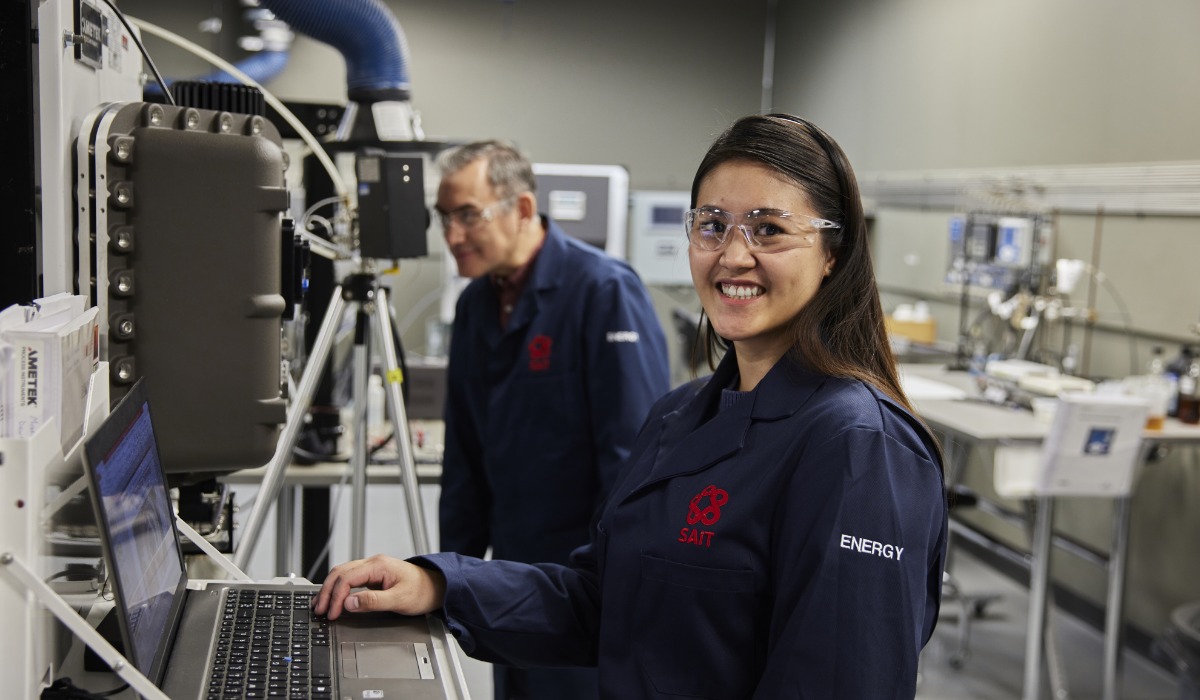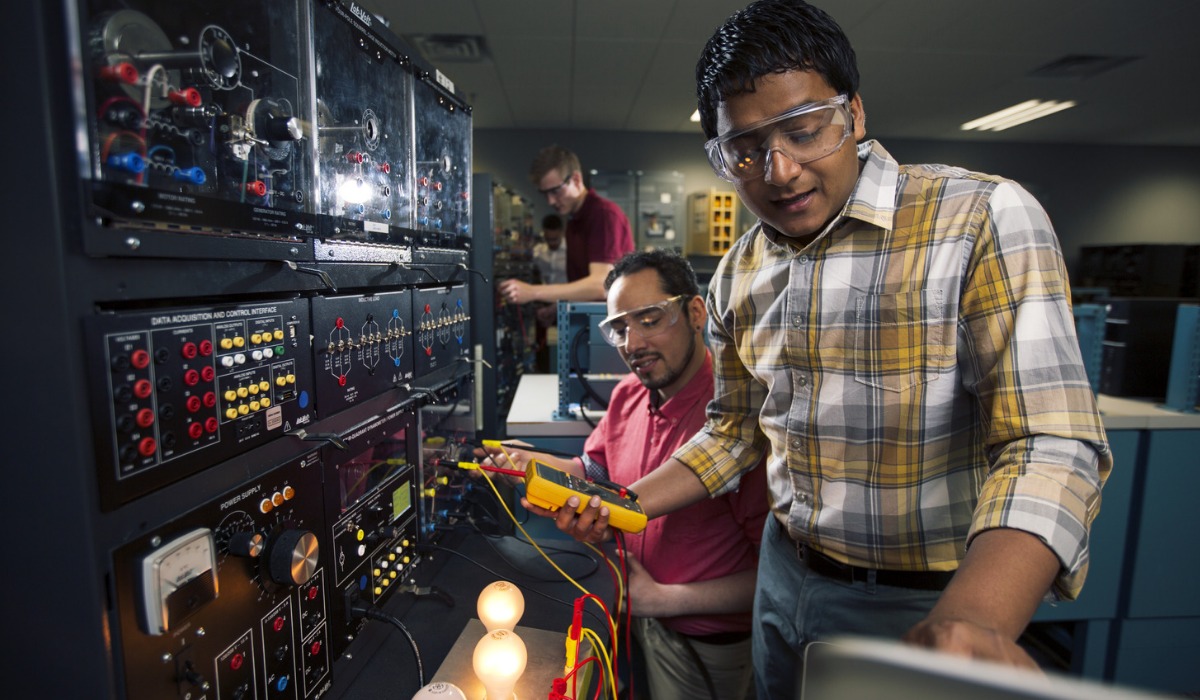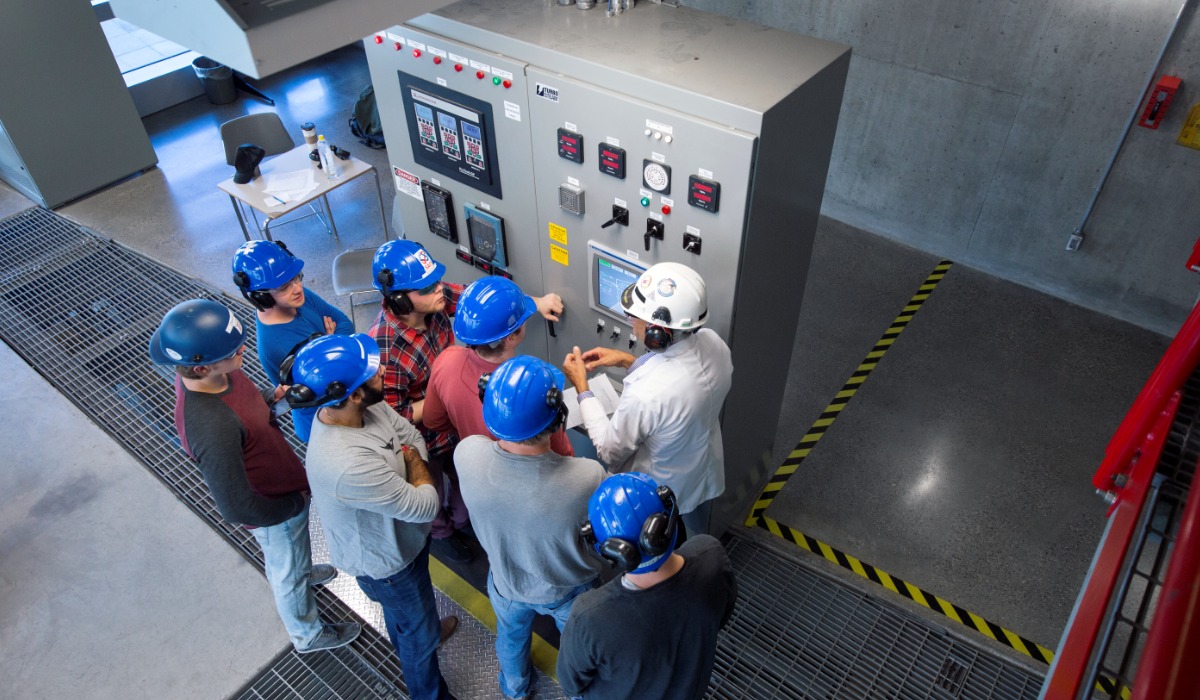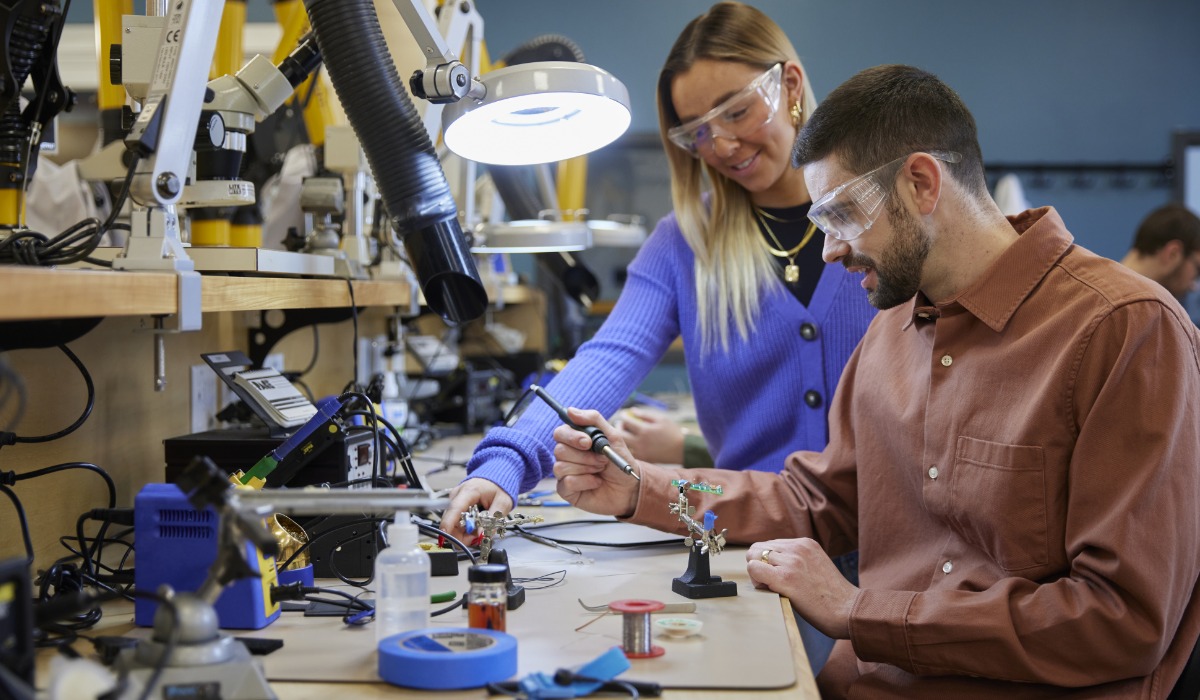Overview
Our comprehensive two-year Power Engineering Technology diploma will equip you with the knowledge and skills to obtain your Third-Class Power Engineer certification.
If you are passionate about energy systems and industrial processes, this program is for you.
As a student, you will:
- study the principles of generating thermal and electrical energy efficiently and safely, knowledge that is essential for operating and maintaining power and process plant equipment
- gain in-depth knowledge of applied thermodynamics, the laws governing heat, energy and work, which are vital for understanding, managing and optimizing energy conversion processes in the power generation and chemical process industry
- gain practical experience operating energy and process equipment, such as boilers, turbines, electrical generators, pumps, compressors, internal combustion engines, chillers and air handling units
- prepare to write the Alberta Boilers Safety Association (ABSA) exams required to attain the Third-Class Power Engineering certification, an important credential in this field
- become familiar with the ABSA standards for the safe operation of pressure equipment in Alberta.
With this diploma, you can explore career prospects as a plant operator, plant shift supervisor, or chief plant engineer across various industries such as power generation, petrochemical, refining, and pulp and paper. The skills you will acquire can also open doors to other opportunities in the energy and process industries, including positions in safety, management, and technical sales.
By the end of this program, you will have the foundation to thrive in the power engineering field.
Those in power engineering tend to be objective, innovative, and methodical.
You need:
- mechanical and some electrical aptitude
- good vision, hearing, and eye-hand coordination
- manual dexterity
- communication skills
- organizational and decision-making skills
- the ability to work with others in a team environment.
Power engineers and process operators control and operate complex systems manually and through automation. You should be analytical and enjoy problem-solving, while adhering to efficiency and safety standards and codes.
Some employers may require colour-blind testing.
Wearing a hard hat and other PPE in the lab is mandatory. Holding a valid driver's license is strongly encouraged.
Graduates of this program can prepare to write the required ABSA exams to achieve their Second- and First-Class Power Engineering certification by taking our flexible Continuing Education courses.
Graduates are eligible for registration in the Alberta Society of Engineering Technologists.
This program is currently under review by Technology Accreditation Canada (TAC.)
After successfully completing this program, you'll receive a SAIT Power Engineering Technology diploma.
Careers and opportunities
Each year, SAIT conducts a survey between February and April to determine the employment rate, salary and satisfaction of our newest SAIT alumni.
![]() 89% graduate employment rate
89% graduate employment rate
![]() $79,000 average starting salary
$79,000 average starting salary
Find out more about our graduate employment statistics >
Our graduates may work in the following occupations. Some careers require additional experience and education.
Associated National Occupational Classification (NOC) codes: 72103, 92100, 92011.
Career planning support
Unsure which career path is for you? Here are some recommended career planning resources to help you decide your future.
You can also head to Alberta alis for lots of information about careers in Alberta, including quizzes and labour market information to help you narrow down a path.
Finally, you can take our online career finder quiz, which can help narrow your options based on your current skills and interests.
Courses
The Power Engineering Technology diploma requires 61.5 credits (24 courses) to complete.
The program spans two years, with two semesters each year.
| Course | Credits |
|---|---|
|
In Applied Mechanics I, you will explore the practical application of mechanics in the power plant and their application to turbines, compressors, pumps, and other machines. You will study statics and dynamics, centripetal and centrifugal force, friction, lifting machines, work, power, and energy. You will investigate the strength of pressure vessels, first moments, second moments, centroids, shearing and bending; torsion, mechanical efficiency, shaft couplings, modulus of elasticity, modulus of rigidity; and strength of materials. Equivalents:
|
3 |
|
AMEC 356 will introduce you to the practical application of fluid mechanics in the power plant, including turbines, compressors, pumps, and other machines. Fluid properties, viscosity, pressure, forces in fluids and buoyant force will be explored. You will learn Bernoulli's equation in a fluid system; pipe and tubing; the continuity law; the general energy equation; pumps and fluid motors, Reynolds' number for fluid flow; type of fluid flow (laminar and turbulent), various types of pumps (dynamic and positive displacement), net positive suction head (NPSH), pump affinity laws, energy losses in fluids due to friction, and Moody charts. Pre-requisites:
Equivalents:
|
3 |
|
This course is designed to develop technical writing and presentation skills to ensure workplace readiness. Students will learn how to evaluate communication situations, analyze documents, assess research sources and develop organizational skills to apply in their work. They will learn about and practice designing, formatting and writing a range of professional documents. Students will also develop confidence (through practice) in the development and delivery of effective and engaging presentations. Equivalents:
|
3 |
|
This applied computer course provides students with critical electronic communications, data and file management skills, along with a strong focus on using common productivity applications to format, calculate, analyze, visualize, and present or report data and information. Equivalents:
|
1.5 |
|
This introductory course is designed to present entry-level power engineering student the fundamental principles of electricity and electrical equipment. Predominately the material presented will reflect the operational requirements of electrical components and systems used in an industrial environment. |
1.5 |
|
This is an introductory course that includes direct current theory and DC machines, alternating current theory, AC machines and AC systems. The course will also cover switchgears and safety, electrical calculations, industrial drawings, valves and actuators, control loops and strategies, instrument and control devices, distributed and logic control and boiler control systems. The labs supplement the theory by using electrical machines and control labs. Pre-requisites:
Equivalents:
|
3 |
|
This is an intermediate course on alternating current theory; direct current machines; alternating current generators; alternating current motors; transformers; electrical system protection; measurement and control components; control instrumentation systems; combustion control and safeguards; environmental control methods; and air and gas compression. Pre-requisites:
Equivalents:
|
1.5 |
|
This course enables the student to apply the basic knowledge of algebra and introductory calculus to resolve applied scientific and technological problems. Applications include linear motion, areas under curves, and volumes of revolution. Equivalents:
|
3 |
|
This course enables the student to apply advanced algebra, integral and differential calculus methodologies to scientific and technological applications. Topics include trigonometric and transcendental calculus, methods of integration, specifically integration by parts, by trigonometric substitution, and by use of tables. Applications include linear motion, areas under curves, volumes of revolution, centroids, moments of inertia, and program-relevant applications. Pre-requisites:
Equivalents:
|
3 |
|
This course provides an introduction to the power engineering industry and background into the construction and development of boilers. A review of basic mathematics applications and an introduction to thermodynamic concepts are presented. Safety procedures for the workplace and environment are explored. The construction, components, operation and maintenance of steam boilers are also described. The course concludes with a discussion on boiler feedwater. The material in this course will help prepare you to write the ABSA 4th Class Part A exam. |
3 |
|
The purpose of this course is to gain hands-on experience in the operation and/or maintenance of power plant equipment, contributing to the ABSA requirements for the Fourth Class Power Engineering Certificate. Following a safety orientation, instruction will be given concerning the identification, purpose, construction, pre-run checks, and start-up/shutdown procedure for various pieces of equipment. The students, under supervision, will operate a high pressure watertube boiler, various turbines, pumps and a low pressure firetube boiler. Boiler water sampling and treatment also will be demonstrated and then performed by students. Corequsites:
|
3 |
|
This course is a continuation of Power Theory I. Auxiliary equipment necessary for the operation of a boiler are explored, and the power sources used in the power engineer industry are described. In addition, an introduction to boiler controls and instrumentation is presented, along with refrigeration and HVAC (Heating, Ventilation, and Air Conditioning). Boiler maintenance is discussed, and refers to various tools and procedures used to operate equipment safely. The power engineering industry includes a number of different types of plants; in this course, hot oil systems, gas plants, pulp mills, food processing and sawmill plants are explored. This course will help prepare a candidate to write the ABSA 4th Class Part B Exam. Pre-requisites:
Equivalents:
|
3 |
|
The hands-on experience in Power Lab II continues from Power Lab I. The students will operate a low pressure and a hot water boiler, ammonia refrigeration system, reciprocating compressor and an internal combustion engine combined with a generator. Several campus tours will also occur to examine the practical application of some of the lab equipment. This lab leads to the completion of the practical experience requirement of operating power plant equipment for ABSA's Fourth Class Power Engineering Examination. Pre-requisites:
|
3 |
|
ASME Code Sections I, II, IV, and VIII, calculations, Industrial Legislation and Codes, Metallurgy, Engineering Materials (welding and testing), Boiler classifications, design, control, circulation, details, construction and operation and maintenance. Fuels and combustion, fans and environment, ash handling systems; water treatment (analytical). Piping, support, expansion, codes, connections, and valves. Pre-requisites:
Equivalents:
|
3 |
|
This course examines the design, regulations, construction, performance and maintenance of various equipment found in industry, relating to power engineering. Pre-requisites:
Equivalents:
|
3 |
|
This course requires the preparation and presentation of an in-depth technical report. The student is expected to draw upon significant learning from various courses throughout the program. Pre-requisites:
Corequsites:
|
3 |
|
This course will familiarize the students with the types of plants that a Power Engineer could be employed; Specific topics covered include hot oil systems, steam related food processes, gas plants, sour gas plants, refinery and upgrading, enhanced oil recovery, pulp mills and sawmills, and alternate energy production. Equivalents:
|
1.5 |
|
This course will provide you with an introduction to safety problems and safe practices in the power engineering workplace, and an appreciation of the potential environmental impact of air, water and noise. You will discuss the perception off risk, environmental responsibility and sustainable development, and relate safety to processes as it relates to pressures and temperatures in the lab. Equivalents:
|
1.5 |
|
Density and pressure, temperature and heat, moments and forces, scalars and vectors, linear velocity and acceleration, force, work, pressure, power and energy, calorimetry, expansion and contraction, gas laws, laws of thermodynamics, thermodynamics of steam, and effects of throttling steam. Equivalents:
|
3 |
|
Steam properties and processes. Carnot and Rankine cycles, refrigeration properties and processes, psychrometric properties and air conditioning processes. Pre-requisites:
Equivalents:
|
3 |
|
You will study the basic theory and application of thermodynamic principles used in Power Engineering. As part of this course you will perform calculations on heat transfer and cycle performance, and investigate turbine operation in a basic steam power plant. Pre-requisites:
|
3 |
|
In Thermodynamics Lab I, you will apply the theoretical knowledge you acquired in power and thermodynamics theory classes. Pre-requisites:
|
1.5 |
|
In Thermodynamics IV Theory, you will learn how to perform calculations on plant equipment other than those in the Rankine cycle. This will include air compression systems, internal combustion engine cycles, and large as well as small gas turbines. These calculations will enable you to measure machine efficiency and performance. Pre-requisites:
|
3 |
|
In Thermodynamics II Lab, you will apply theoretical knowledge you acquired in power and thermodynamics theory classes. Pre-requisites:
|
1.5 |
Progression
You must attain a PGPA and/or a CGPA of 2.0 or better each semester and pass the prerequisite courses to progress through the program.
To qualify for graduation, you must pass all courses, attain a CGPA of 2.0 or better and complete course requirements within the prescribed timelines.
Review our grading and progression procedure >
Explore your options!
Some courses in this program are available through Open Studies. You can complete courses via Open Studies to get a head start on your education, reduce your course load once accepted into a credentialed program, or determine which career path best suits you before you fully commit.
You may also take courses for general interest or personal and professional development.
Admission requirements
Applicants educated in Canada
Applicants must demonstrate English language proficiency and meet one of the below requirement options.
Option A
Completion of all the following courses or equivalents:
- at least 60% in Math 30-1 or 75% in Math 30-2, and
- at least 60% in English Language Arts 30-1 or 75% in English Language Arts 30-2, and
- at least 60% in Physics 30.
Option B
Completion of all the following or equivalents:
- SAIT Power and Process Operations certificate program and
- at least 60% in Physics 30.
SAIT accepts high school course equivalents for admission for applicants educated outside Alberta.
All applicants who were educated outside of Canada must demonstrate English language proficiency and provide proof they meet the program admission requirements outlined above with an international document assessment. Find accepted educational documents and assessment options.
SAIT may also accept courses completed at certain international post-secondary institutions.
Academic Upgrading
Missing an admission requirement for this program? Upgrade your prior education to help you receive admission into one of SAIT's career programs.
English language proficiency
All applicants must demonstrate English language proficiency prior to admission, including students educated in Canada.
Transfer agreements
At SAIT, we have created transfer agreements with partner institutions to allow you to earn course credits toward your SAIT program based on your previously completed credentials.
Transfer Alberta search tool
Use the Transfer Alberta search tool to see all transfer agreements between Alberta post-secondary institutions (including those with the University of Calgary, Mount Royal University and Bow Valley College.)
Search transfer agreements in Alberta
Transfer options for graduates
When you have completed this program, you may continue your education at a partner post-secondary institution. These transfer agreements include partnerships within and/or outside of Canada.
Credits this program transfers to
- Available credits:
- 27
Upon successful completion of this program, you can receive 27 credits towards the 123 credits required to earn your Bachelor of Science - Energy Engineering degree at the University of Calgary, provided you meet the admission requirements.
- Available credits:
- 57
Upon successful completion of this program, you can ladder into the third year of TRU's Open Learning Bachelor of Technology program, provided you meet the admission requirements.
- Available credits:
- 60
Upon successful completion of this program, you can ladder into the third year of TRU's Open Learning Bachelor of Technology: Trades and Technology Leadership program, provided you meet the admission requirements.
Available intakes
Fall 2026
Start dates:
- Domestic students: Waitlisted
-
-
Application deadline: June 30, 2026
-
- International students: Open
-
-
Application deadline: May 29, 2026
-
Winter 2027
Start dates:
- Domestic Students (apps open March 4, 2026): Closed
-
-
Application deadline: Oct. 23, 2026
-
- International students: Open
-
-
Application deadline: Oct. 9, 2026
-
Costs
2025/26 tuition and fees
The following estimated costs are effective as of July 1, 2025.
The estimated total cost of tuition and fees is based on the suggested schedule of study. Following a modified schedule will impact the fees you pay per semester and may alter final costs.
Domestic students
The program total is based on the estimated amount you will pay if you enter this program during the 2025/26 academic year. The program total amount listed on your letter of admission may appear higher. This amount is your maximum tuition guarantee for the program. SAIT will not exceed this maximum, regardless of changes in tuition and fees between academic years.
Books and supplies are currently $1,600 per full-time year.
This is a bring-your-own-device program with standard computer hardware and software requirements. See the specific requirements on our computers and laptops page.
You'll require the following books and reading materials for the program, which can be purchased from PanGlobal:
- Power Engineering Fourth Class Textbook Set - Part A, Part B and Academic Supplements (used in PENG 201, PENG 203, PENG 251, PENG 253, THRM 208, and THRM 258)
- Power Engineering Third Class Textbook Set (used in ELCT 304, PENG 301, and PENG 351)
- Power Engineering Second Class Textbook - Part B3 (used in ELCT 354)
- Power Engineering Fourth Class Textbook Set - Part A (used in SFTY 215)
AMEC356 will require Mott, Robert L; Untener, J. A. (2015): Applied Fluid Mechanics (7th in SI Units ed.), Pearson, which can be purchased from the SAIT Bookstore.
Required personal protective equipment (PPE)
The industry-approved PPE you'll need will be discussed during your first few days of classes.
We recommend wearing CSA-approved (green triangle, above the ankle) protective footwear in our labs. A hard hat and safety glasses will be provided to you. Hard hats are required to be worn in the lab.
Required equipment/tools
You'll require a scientific calculator capable of performing linear regression.
Financial aid
Paying for your education may feel overwhelming, but we have resources and programs that can help, including information about payment options, student loans, grants and scholarships.
Application process
Ready to apply?
Follow our step-by-step guide to submitting a successful application.
Communication during admission
Email is the primary source of communication during the selection process. Ensure your personal email account is managed appropriately to receive our emails, files and communications. We recommend you add the macphail.students@sait.ca domain to your safe senders' list or you risk missing critical email messages.
Begin your application
Apply now using the online application portal.
Ensure you have a valid Visa or Mastercard to pay the non-refundable application fee of $120 for domestic applicants or $175 for international applicants.
Information sessions
Prepare for a strong start in your chosen program or get the details you need to decide your future path.
Our expert staff and faculty are ready to answer your questions and provide information about the following:
- What sets SAIT apart
- An introduction to the program and area of study
- Admission requirements
- Future career paths
- Information on the earning potential and graduate employment rates.
Contact us
MacPhail School of Energy
-
Phone - 403.284.8451
International Student Advising
-
Phone - 403.284.8852
-
Email - international@sait.ca
Subscribe for updates
Your journey starts here! Sign up to get important updates on:
- Energy and environment programs
- Application information
- Relevant news and events

Oki, Âba wathtech, Danit'ada, Tawnshi, Hello.
SAIT is located on the traditional territories of the Niitsitapi (Blackfoot) and the people of Treaty 7 which includes the Siksika, the Piikani, the Kainai, the Tsuut’ina and the Îyârhe Nakoda of Bearspaw, Chiniki and Goodstoney.
We are situated in an area the Blackfoot tribes traditionally called Moh’kinsstis, where the Bow River meets the Elbow River. We now call it the city of Calgary, which is also home to the Métis Nation of Alberta.
